Vincenzo Donatiello and his Don Gino
World-famous award-winning Maître d' and sommelier, soul of the 3* Michelin restaurant Piazza Duomo in Alba, writer (I serve. Modern dictionary for waiters), speaker, gin lover and producer of DONGINO sartorial gin, the Pinot Noir of Gins.
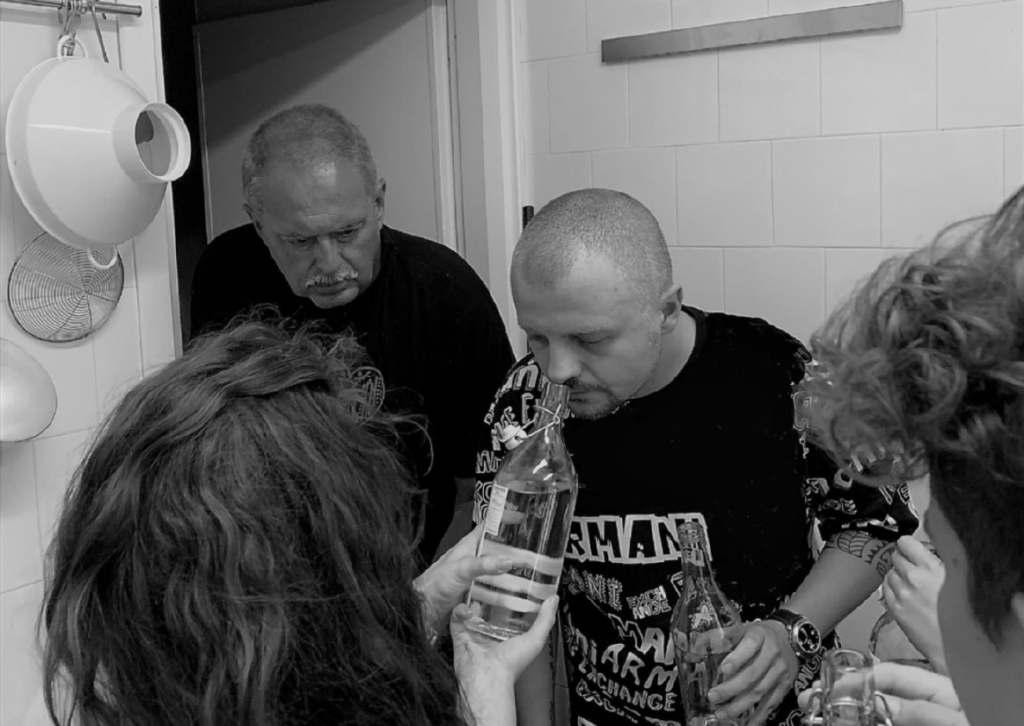
We met Vincenzo during one of his "inspections" in the distillery. He never leaves anything to chance, every little detail, every nuance, every perception must be pigeonholed in the right place: this attitude towards perfection is called professionalism. This is precisely one of the traits that distinguish Vincenzo, whether you meet him on duty in Piazza Duomo or among the stills of the Cillario & Marazzi Spirits Co. distillery: pure professionalism, never ostentatious.
"Hello Vincenzo, how is the DONGINO going?"
“Very well, every day is a great satisfaction! By now the DONGINO is constantly in the bottles of the best cocktail bars and more and more wine bars are putting it on display to satisfy the requests of demanding customers. I am very happy and also at the Piazza Duomo Alba restaurant more and more people ask me to taste the DONGINO and go home happy with a bottle.”
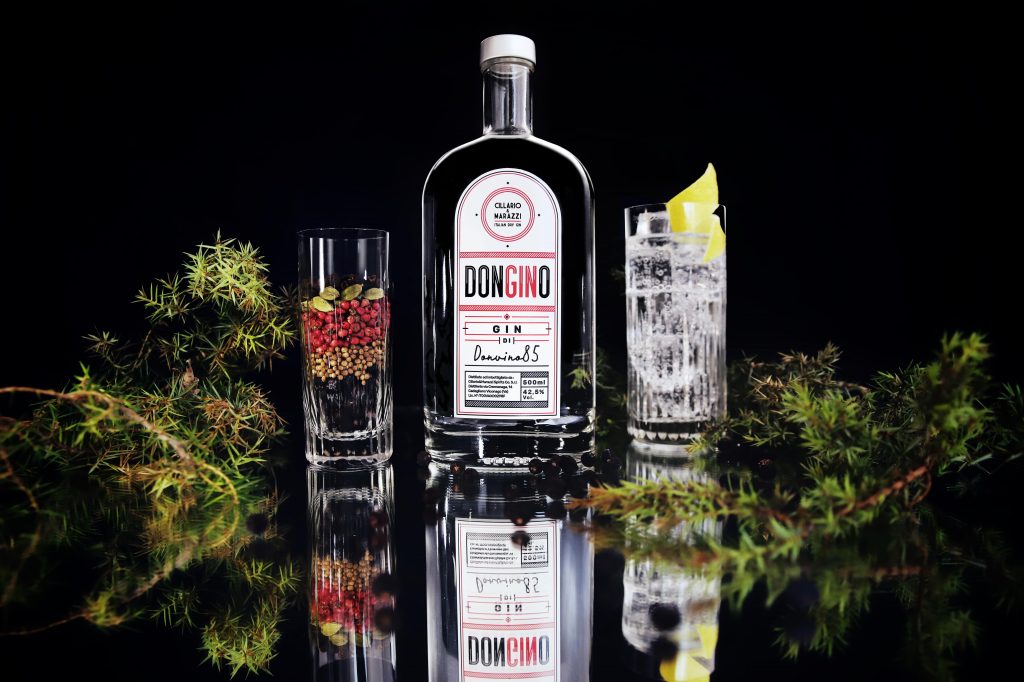
“Tell us how the desire to produce your own gin was born”
“I always have projects on my mind and I like to study and explore the things that fascinate me. That was the case with wine and it is the same with gin. I am passionate about the versatility of this distillate and the possibility of working with a large variety of botanicals that allow you to give the eyes, nose and mouth great emotions in many hours of the day. The perfect transparency, the scents of juniper and the light notes of the other botanicals, the fullness of the taste and the soft persistence drive me crazy. I looked for a distillery to rely on for the realization of my project and it wasn't easy at first. Then at Identità Golose in 2019 I met Attilio Cillario and Gigi Marazzi of Cillario&Marazzi Spirits Co. and there was an immediate feeling, we speak the same language: quality, quality, quality. They are truly the tailors of gin and with patience they have followed and put into practice the idea I had in mind: to distill the Pinot Noir of Gins. We started from the fundamentals: the best raw materials and the best tools.”
"What do you mean?"
“Distilling DONGINO is like cooking in a starred restaurant. We start from the search for the best raw material and study the best preparation techniques. For the gin we have chosen a certified organic Italian wheat alcohol. It is a gift from the earth, fragrant, round, you feel the Italian sun inside. Common wheat certainly is a noble raw material for distillation, it is little used because it is very expensive compared to other alcohols of less noble origins but it allows to obtain alcohol of the best quality. In addition to the alcohol, a large amount of water was needed and the mountain spring water in the distillery is perfect. It is still an untouched area, full of springs, lakes, rivers and woods, a perfect place.
And finally, we needed an alembic that respected juniper and other botanicals. Most of the distillery uses industrial stills which are large pressure cookers where the temperature and pressure of the alcohol are brought to very high values in order to obtain very large productions in a short time. Just as in the kitchen no one would think of preparing a dish of tajarin with truffles by placing all the ingredients in a pressure cooker, in the distillery we have discarded any industrial solution and chosen a discontinuous, atmospheric, low temperature alembic so as not to attack the botanicals and preserve every note, every aroma. Cillario&Marazzi only use this type of still to the detriment of large productions and I felt at home, it was what I was looking for.”
“Can you be more specific?”
“The alembic we use for DONGINO is made of thick copper and works at atmospheric pressure. The temperature is the lowest possible at this pressure and the extraction of aromas and oils from the botanicals takes place through the passage of alcohol vapor through the layer of botanicals placed in the head of the alembic.
Many botanicals are fresh and are broken or peeled a second before distillation begins. Only in this way are we guaranteed to find the notes and nuances of every single botanical in the distillate, each in the right place like a symphony.
The distillation lasts 12 hours and the alcohol vapor when it reaches the condenser becomes liquid, slowly drop by drop. The whole procedure is very gentle and slow, the alcohol delicately massages the botanicals and these at the end of the distillation still have their original colors intact and smell good, fresh.
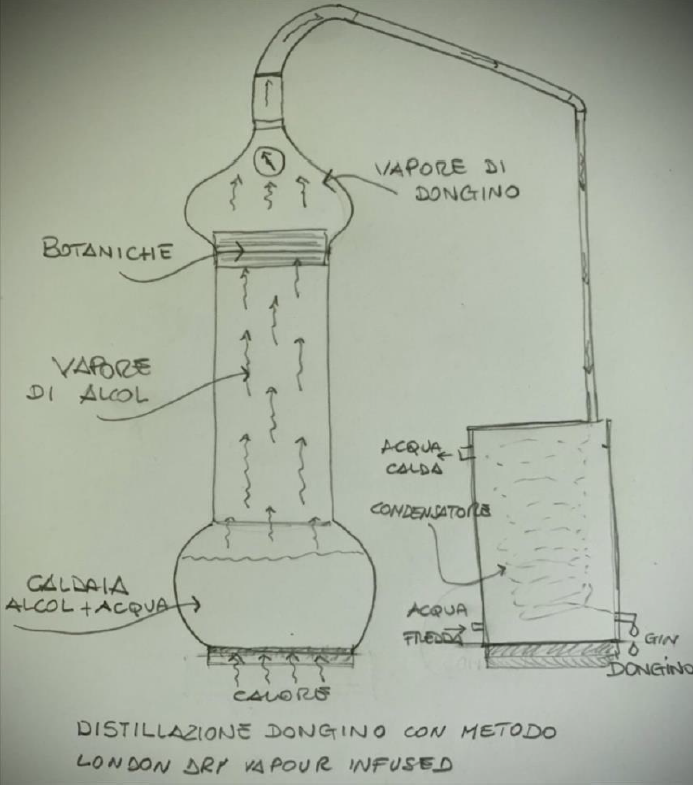
With different distillation systems, which use high pressure and high temperature, the contact of the alcohol vapor on the botanicals lasts a very short time and the botanicals at the end of the distillation are like inert, odorless pebbles.
Even the system that involves putting the botanicals in the boiler or making an infusion in alcohol before distilling cannot compete with the method with the passage of steam at low temperature. “You have been very clear. Two more words about DONGINO.
What kind of gin is it?” “Great question. Right now the offer is wide and as always it is useful to have some basic notions to extricate yourself in the choice.
There are 3 main categories of Gin.
London Dry Gin that doesn't necessarily have to be produced in London as some mistakenly think. The wording "London" indicates the distillation style of the gin and a London Dry Gin can be distilled anywhere in the world as long as an agricultural alcohol and all natural botanicals are redistilled. At the outlet of the condenser the alcohol content must be greater than 70%Vol and after distillation no other flavourings, sweeteners or colorings can be added. What you have obtained, brought to gradation, is what you will put in the glass and therefore it is the most difficult method but it is the method that best represents this fantastic distillate. The steam infusion is a further refinement of the London Dry method and for DONGINO it is a must, the icing on the cake.
Distilled Gin unlike London Dry has a more permissive regulation. The starting spirit must be redistilled together with natural flavoring substances but the botanicals can be distilled separately and added later to the base spirit. Furthermore, it is possible to add artificial flavors and colors after distillation and there is no minimum alcohol content at the condenser outlet.
Compound Gin brings together a large variety of gins, many of which are of low quality, comparable to alcohol flavourings.
It must be composed of ethyl alcohol with any natural or artificial flavoring substance as long as it is authorised. Oils and essences are often used rather than fresh or dried botanicals and a redistillation of the alcohol is not mandatory. The flavoring substances can simply be mixed into the base spirit.
“Excellent, very interesting and everything is clear. One more curiosity: what are the botanicals you have developed with the Master Distiller and which are the basis of the DONGINO recipe and why did you call it the Pinot Noir of GIN?
“Pinot Noir has always fascinated me because its grapes are the most difficult to grow and make wine. It is a real challenge to nature but when the work in the vineyard and in the cellar is done by skilled hands and heads, the result is extraordinary for its elegance, for the absolute fidelity between what is felt on the nose and in the mouth. The balance between the spicy, fruity and floral notes of red fruits, the vegetable notes, the balsamic ones and the softness that unites everything, give you very strong emotions with every sip.
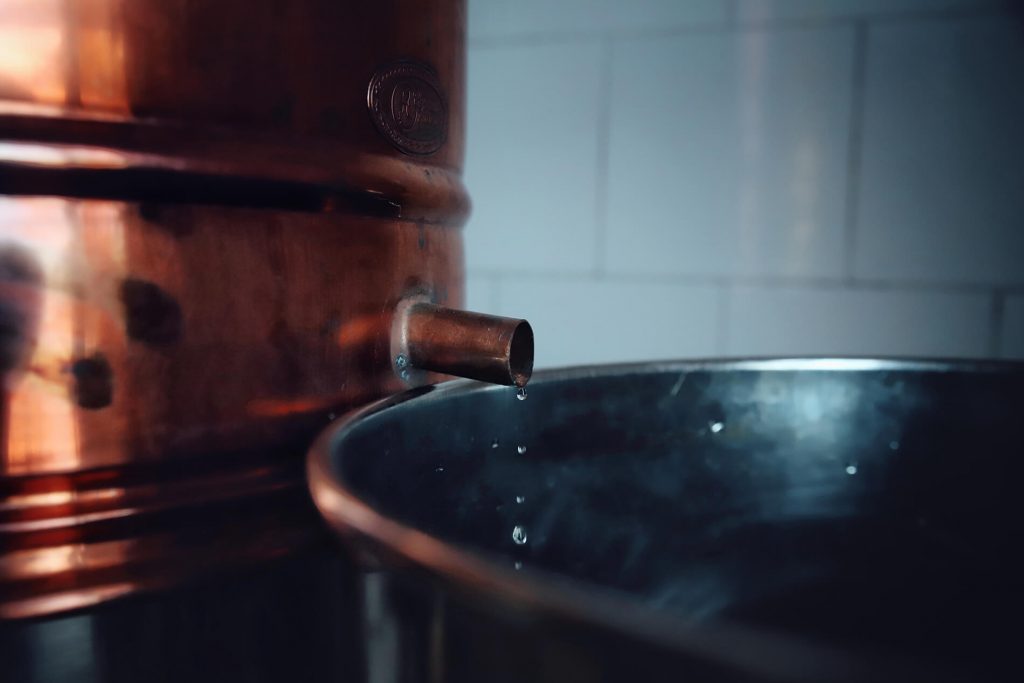
Pinot Noir is elegance, magnetism, whispered and not shouted notes, persuasion and charm and these are the elements that I have tried to bring into DONGINO and this is why I love to call it the Pinot Noir of Gins. To get to DONGINO I started from here, and to prepare the distillation a real team effort was made and we divided the botanicals into groups based on what we wanted to achieve. Being able to have the expertise of Attilio and Gigi and a large variety of unique botanicals thanks to the help of Francesca (ed. the soul and mind of All spices in the world) was very, very pleasant. To tell you all the details, I have to help myself with the notes I wrote on the phone, there is a lot of information that I have accumulated and sorted as the thoughts became reality.
Balsamic notes: juniper, green cardamom, galanga, catmint.
Juniper with its notes of resinous wood, as it should be in gin, is the master. All the attention has gone into the search for a perfect, Mediterranean juniperus communis, harvested by hand to be sure that the berries are whole, without breakage and without resin leakage which, in contact with oxygen, oxidizes and leaves bitter tones . This is an often overlooked detail but to do great things the difference is in the small details.
A touch of green cardamom and you feel immediately transported to other worlds. Cardamom and galangal are part of a family of plants which also include ginger and the fresh and pungent notes of these botanicals are what is needed to obtain a great gin.
A little catmint: here we go home. The balsamic freshness of catmint or mint as it is called, is used in the kitchen in many Italian regions and is delicious and brings back memories of my origins.
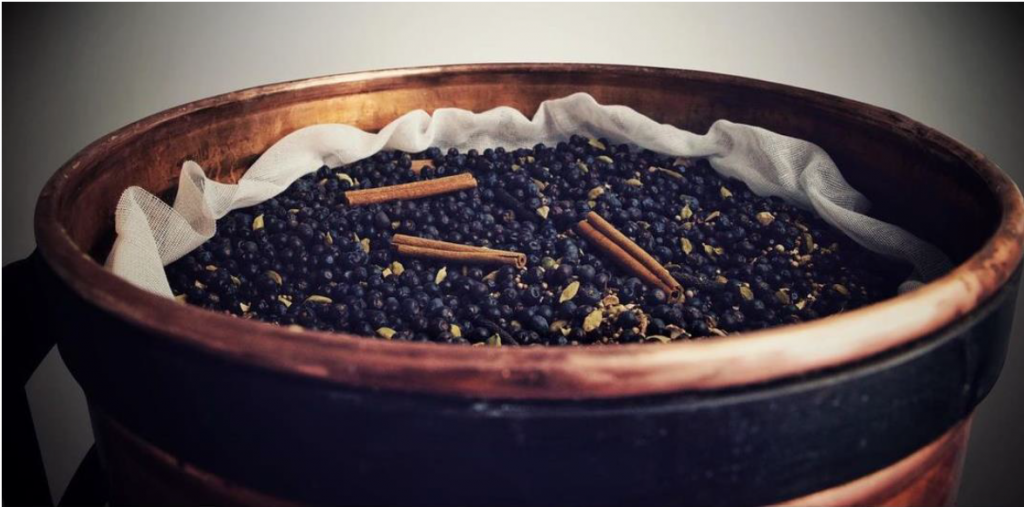
Spicy notes: Bengal long pepper, Sarawak pepper, Timut pepper, Sichuan pepper, Andaliman pepper, pink berries (pink pepper), coriander.
Different types of pepper, all particular and with spicy notes but each with precise characteristics and nuances: nutmeg and citrus in Bengal long pepper, camphor and citrus in Sichuan pepper, grapefruit in Timut pepper, mandarin and orange in Andaliman pepper, fruity freshness in Sarawak pepper. And then the pink berries
which for convenience we call pink pepper but what pepper it is not and which combines its slight spiciness with fruity and floral notes. Finally, a great botany, his majesty the coriander which with its slight citrus spiciness, has the ability to harmonize and mix all the other spices.
Citrus notes: Costiera lemon, Ribera blood orange, Kaffir Lime leaves.
For the citrus notes we decided to use the fresh lemon peel from the Amalfi Coast and to give a softer and more seductive shade we used the blood orange peel from Ribera. Round sweetness, a voluptuous fruit and in any case dry, dry and never cloying. Finally, to give an exotic tone, the freshness of the kaffir lime leaves.
Vegetable, herbaceous and bitter notes: rosemary, yarrow, angelica, oregano, calamus.
For the vegetal, herbaceous and balsamic notes, what could be better than rosemary, a travel companion in a thousand recipes in the kitchen. To create harmony the yarrow of which we have used only the flower, the angelica kind cousin of parsley and dill of which we have used only the root, the oregano with its spicy herbaceous notes and the calamus, pungent and with the characteristic closure bittering.
Sweet notes: Calabrian licorice, chamomile, cinnamon, cassia, carob, iris.
To balance the notes I told you about and to make drinking pleasant without falling into excessive cloying, a rebalancing on sweet tones considering that the base of organic Italian soft wheat alcohol already has a roundness and softness impossible to find.
Then a light brushstroke of Calabrian licorice root is sublime, it satisfies every receptor and calls for the next sip. A few chamomile flowers to recall a slight mellifluous and relaxing scent and small signs of Ceylon cinnamon and the more muscular, pungent Chinese cousin Cassia. Finally, a novelty: carob. This plant has accompanied man's life in the Mediterranean for millennia and today it perfectly closes the sweet notes of DONGINO with persuasions that reach the sensations given by cocoa beans.
To close and keep everything together, the Florentine iris or iris. The rhizome of the iris has been used for centuries in perfumery for the sweet aroma of violets and to block and fix all the other oils and aromas in the perfume or distillate, to prevent everything from fading and flying away over time.
I got carried away until I bored you, I'll stop here but this is a beautiful world made of colors, aromas, strong sensations, mild sensations, travel through time and space. It's like painting using grain alcohol and spring water to dilute, soften, mix and make the drawing unique.
“You were overwhelming, you kidnapped us and took us by the hand into this fantastic world. We didn't think there was all this behind a bottle of DONGINO. You made us want a taste. Before saying goodbye, one last question: how do you recommend drinking DONGINO?”
” I recommend drinking DONGINO also smooth, served with two ice cubes and if you want with a citrus zest. I love it in Gin Tonic with Fever Tree's Mediterranean Tonic Water which enhances its aromas or in a classic Martini with olives. All in the company of friends and the person you love. The joys of life."
“Thank you for your time and for all the interesting news you gave us. See you soon at Piazza Duomo Alba and there we will ask you for a DONGINO to drink together.”
“It will be a real pleasure! I wait for you.
Vincenzo greets, collects some gift boxes with the DONGINO and with his freshly printed book, he has to meet some friends.
He gets into the car and waves: “I have to go back to Alba, tonight we are full and I have to arrive a little early, I have to be in shape for my clients. This evening I serve, smile!”


